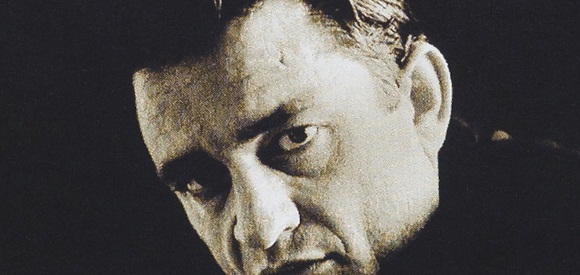Memoir in a Melody: Johnny Cash Announces ‘I Walk the Line’
By Kelsey Osgood

In our Memoir in a Melody series, Biographile writers examine the storytelling of well-known musicians, exploring the autobiographical elements of their famous songs.
In the early to mid-1950s, the country music industry was booming, and producer Sam Phillips of Sun Records was at the center of it all. All manner of blues and country stars got their start in his recording studio on Union Avenue in Memphis, Tennessee, from B. B. King to Jerry Lee Lewis to the King himself, Elvis Presley.
In 1955, an unassuming home equipment salesman named Johnny Cash showed up and nervously asked Phillips for an audition. Cash grew up singing gospel music while working in the cotton fields with his family; at twelve, he learned to play the guitar, and he had formed his first band, the Landsberg Barbarians, while serving in the United States Air Force in Germany. Phillips agreed to let Cash sing for him, but was unimpressed with his gospel, and told him so. Cash returned with his guitarist Luther Perkins and bassist Marshall Grant -- together known as the Tennessee Two -- and debuted what would become his signature style: rockabilly anthems underpinned by a steady boom-chicka-boom beat.
Cash’s first single for Phillips was the somewhat mawkish "Cry! Cry! Cry!" It did well enough to earn Cash a spot on the Louisiana Hayride Tour, but it was his third attempt, “I Walk the Line,” that solidified his fame and became his first #1 Billboard hit.
Cash got the compositional inspiration for the song from an eerie-sounding backwards playback of guitars recorded by accident while on duty in Germany. Cash had originally wanted the song to be slow, like a ballad, but Phillips preferred the up-tempo version, and Cash conceded when he saw it got a better reaction from audience members. In order to achieve that signature snapping sound, Cash, who loved snare drums but knew they weren’t often used in country music then, allegedly put strips of paper into the strings of his guitar. At the beginning of original recordings, the listener can hear Cash humming before each new verse; this was because the song changed keys a number of times throughout, and each time Cash had to hum to get the correct pitch.
The song’s lyrics, though simple on the surface, reveal a great deal about Cash’s musical influences as well as his domestic life at the time. It is basically a love song, and the gist of it is that the narrator is professing his refusal to cheat on his wife. As the Man in Black himself put it in his 2003 book Cash: the Autobiography, "I wrote [the song] when I was on the road in Texas in 1956, having a hard time resisting the temptation to be unfaithful to my wife back in Memphis." Cash played the first few verses backstage for his touring partner Carl Perkins, who suggested the title out of the proclamation that ends each verse: “Because you’re mine/I walk the line.” His wife at the time, Vivian Liberto, remembers him making that exact promise to her in her 2008 memoir I Walked the Line: My Life with Johnny Cash:
"Baby, are you ever tempted by those women at your shows?" I asked…
"When those women come up to me," [he responded], "I think of them as mannequins. I look at ‘em like they’re mannequins. Just phony, plastic mannequins… you don’t need to worry, baby. You’re on my mind every minute, day and night. I walk the line for you."
Like many of his songs, and many works in the country genre generally, there is something Biblical about the language here. The Apostle Paul -- the basis for Cash’s little-known novel -- famously wrote in Galatians 16, "And as many as walk according to this rule, peace be on them, and mercy, and upon the Israel of God." The Greek verb here is stoicheo. It means to behave righteously, but is also used to refer to how soldiers march -- which is to say, in a line. In the newest work about Cash, Johnny Cash: The Life, author Robert Hilburn suggests that this song was Cash’s "first gospel hit," and that he often spoke of it as a declaration of his Christian faith.
Though Cash’s moral ambitions, clearly embedded in him from his religious upbringing, were high, he didn't exactly live up to them. His growing attachment to tour partner and Carter Family singer June Carter led to increasing strife within his marriage, and Liberto and Cash divorced in 1968. His promise might have been for naught, but at least the rest of us got a good song out of it.
